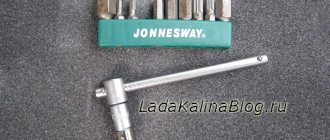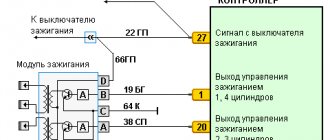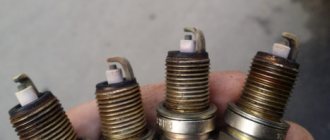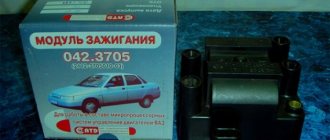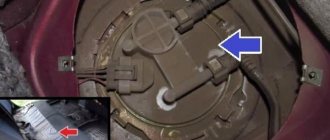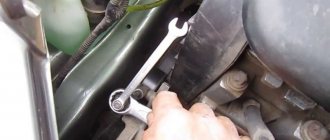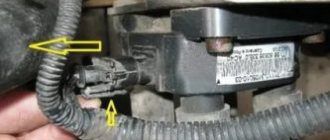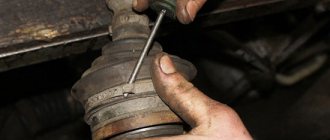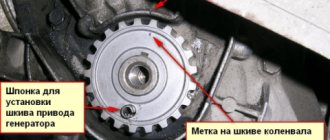It all started when, on the way home from work, for no apparent reason, the engine started to misfire and stopped pulling. Before this, a check light came on on the dashboard, after blinking several times. The problem was solved by stopping and restarting the engine. A few days later the same thing happened again. I decided to diagnose the car.
Diagnostics showed the following error: “misfire in cylinders 2 and 3.” After talking with service technicians and scouring the Internet, I decided to replace the spark plugs. I bought the car used with 50,000 mileage, so I can’t say how long the spark plugs lasted, but they looked normal - the gap was 1mm, there was no carbon deposits (see how to check here).
With new spark plugs, the engine began to run more stable, but after a few days the misfire error popped up again. After some more searching on the Internet, I decided to check the ignition coil and armored wires. You can find out how to do this from the car’s operating instructions; there are detailed instructions there, so I won’t give them here.
The check showed that everything seemed to be normal. What then is the reason? And the reason was this. The ignition coil (on 8-valve Kalinas) is conventionally divided into two parts, the first of which is responsible for cylinders 1-4, the second, respectively, for 2-3. Since misfires constantly occurred in 2-3 cylinders, I decided that it might be a faulty coil.
I bought a new SOATE at the store (price 500 UAH).
When installing, do not mix up the armor wires. They all have their own number (1, 2, 3, 4), the numbering of the cylinders starts from right to left. On the ignition coil, all terminals are also numbered:
After replacement, misfires no longer occurred. Armor wires can also cause misfires; if their resistance exceeds the norm too much, then they have become unusable and require replacement. If misfires appear in individual cylinders, then it makes sense to check the valve clearances and compression. There is also no need to ignore the injectors; they may need to be cleaned. Check the crankshaft position sensor.
How to rebuild a Lada engine
Serious malfunctions, of course, are very difficult to fix on your own, without special equipment, but every driver should know the basics. So, how to rebuild an engine?
Remove the motor and dismantle its components in the following sequence:
- water pump;
- generator;
- carburetor;
- starter;
- gasoline pump;
- collectors;
- ignition system breaker;
- camshaft drive;
- valve cover;
- flywheel;
- clutch device;
- pulley;
- cylinder head.
Now clean the parts and carefully inspect them for damage. If you notice any defective ones, replace them with new ones. It is advisable not to use used parts, even if they are in reasonable condition.
Repairing the cylinder head. Here you should change the seals and put the valves in order. We carry out installation in reverse order
When replacing spark plugs, it is important not to forget to check the safety valve, since a short circuit may also blow the fuse
Is the engine acting up? Check the spark plugs!
So, what should we do if we set off on a long journey, but suddenly, unable to withstand a severe test of strength, the car stalled midway? The situation is not pleasant. But don’t give up, it’s time to get down to business. The problem may lie in the following.
- Most likely, you filled your car with gasoline of not the best quality. It's possible that debris somehow got into the motor. Just in case, it’s still worth cleaning the fuel lines and the tank itself, drying it and filling it with normal fuel that you are sure of. By measuring the pressure in the fuel rail, you will know whether there is a problem here or whether you need to look further.
- Damage to the fuel pump. It is easier to identify this problem: if the ignition is still turned on, then if there is a defect, the fuel pump makes a characteristic sound, indicating a malfunction. Remove the pump from the gas tank and check the outlet pressure in the tank using the power supply method. The pressure coefficient should not be less than 2 atmospheres.
- Ignition system failure: spark plugs do not produce a spark. To fix the breakdown, you just need to replace the spark plugs with new ones; it won’t take much time.
- Throttle assembly defective. This unit is the most important part that performs a significant part of the engine’s work. When it deteriorates, air and fuel mix, which leads to engine stupor.
- Injector failure. This is the most rarely encountered problem.
- It is necessary to adjust the timing valves if for some reason there is a violation of the clearances.
- The gas pedal needs repair.
- The motor has not yet been run in, so it malfunctions. The solution to the problem is simple: you need to be patient and break it in, driving 6000-7000 km. But it is worth remembering that the speed cannot be raised above 3000, otherwise serious repairs will be required after break-in.
This sensor monitors oil pressure
How to wash your engine safely
So, we have studied the main engine malfunctions and received advice on how to prevent them. Now let's talk about emergency assistance to a car that suddenly began to lose speed and is about to hopelessly stall.
If there is a problem on the road, use the emergency lights
We open the hood and examine the condition of all the parts. If you notice broken or burnt wires, replace them. Hoses, filter (it can be found under the bottom of the car), fuel lines - all this needs a thorough inspection. There may be a microscopic crack somewhere that is causing the failure. If there is a gasoline leak, it must be fixed as quickly as possible, because it may end in an explosion.
Prevention of such a phenomenon as engine “triplication” is that the car owner needs to promptly eliminate the most common malfunctions of the engine, as well as other related systems. To do this, it is necessary to strictly adhere to the periodic maintenance schedules established by the manufacturer for the vehicle.
At the same time, if you have little experience in owning a car, it is better not to engage in serious technical work yourself, but to entrust their implementation to experienced specialists.
In addition, it makes sense not to delay carrying out prevention at the first deterioration in engine performance, attributing them, for example, to low-quality gasoline. At the same time, all preventive measures should be carried out only in those auto repair shops where experienced craftsmen work. For example, incorrectly set ignition timing can lead to the appearance of “triple”.
Unqualified service station employees very often sin with this, especially if the car owner is a novice behind the wheel and has little understanding of the technical side of the matter.
In the same case, when all systems and components of Kalina work correctly, the “triple” effect should not occur. In this case, the service life of the engine should be significantly reduced, since the power unit, in which one of the cylinders is inoperative, may experience increased loads, leading to its accelerated failure.
Of course, you can and should wash the engine, but it must be done correctly. It would seem that it could be simpler: I took the car to the car wash, quickly washed everything, and no problems. However, in reality this does not always happen. The engine may not start or start to stall, and the indignant car owner will be told that the administration is not responsible for the consequences of washing the engine.
In addition to the fact that water under powerful pressure penetrates through seals where it should not be, the picture is complemented by shampoo for contactless washing, which is much more aggressive than conventional shampoo for manual washing. The strong alkaline environment of such shampoo causes corrosion of aluminum and copper parts and failure of various sensors. There are often cases when the owner washed his “swallow” so thoroughly that he disabled all the electrics.
Finding the cause of the malfunction
The engine starts to stall when the fuel pump malfunctions and does not pump in the required amount of fuel, or when it does not burn completely. The substrate of the first case is not only the fuel pump itself, but also the conductive system. And the second reason may be related to problems with the ignition system, spark plug carbon, or improper operation of the engine valves.
If the fuel system is not working properly
, the feeling that the engine is stalling will develop a minute after the start, and then will only increase. If there is a narrowing of the pipeline, or there is no power to the fuel pump, such problems are not uncommon. You can check this after exposing the relay: start the engine, check the functionality of the pump and relay. In this case, the on-board computer will not show errors.
If there is a problem in the valve apparatus itself, in the spark plugs or in the ignition system, it will also manifest itself. Namely: the engine will start normally, but a moment later it will start to stall. Similarly, the power unit fault light should light up, because standard sensors perceive an excess (or lack) of fuel.
When such interruptions in the fuel supply occur, twitching develops, because the amount of gases produced in different engine operating cycles varies.
The engine stalls when hot: causes and common faults
Let's start with the main features. Often, a cold engine starts quite normally, but then begins to stall after partial warming up or completely reaching operating temperatures. In this case, tripping can occur both at idle and under load (while driving).
In any case, incorrect readings or malfunctions of sensors (lambda probe, temperature sensor, mass air flow sensor, etc.) and actuators can cause a hot engine to fail. Based on incorrect readings, the ECU may well over-enrich the working fuel-air mixture and flood the spark plugs.
If the spark plug is wet and/or oily, then it is quite obvious that too much engine oil is entering the combustion chamber or the fuel is not being burned in the cylinder. In any case, a wet spark plug does not allow the cylinder to operate normally. Let us add that often both causes are often present simultaneously or are a consequence of each other.
If all the spark plugs are wet, you should check the oil level in the internal combustion engine. When the level is elevated (often as a result of overflow), the oil pressure in the lubrication system after the engine warms up exceeds the norm, excess lubricant penetrates the combustion chamber and contaminates the spark plugs. The result is a weak spark.
Consequences of error P0300
When an engine misfires in the exhaust pipe, the level of exhaust gas toxicity increases, which, in turn, can also lead to an increase in the temperature in the catalyst, which causes its damage (the honeycombs melt because the temperature exceeds the threshold of 800 °C ). On some cars, in order to reduce the burnout of fuel in the catalytic converter and, consequently, the level of toxicity, the ECM unit monitors the frequency of misfires using crankshaft and camshaft sensors and, in addition to registering error p0300, signaling a checkengine light, it can also turn off the injectors of a specific cylinder, in which the gap was discovered. It is worth mentioning that most often, for some reason, the owners of cars such as Lacetti, Matiz, Priora and other injection VAZs, as well as Opel, Nissan, Kia cars, are interested in the reasons for the occurrence of this error.
Diagnostics using a computer
If your car is equipped with a modern control unit, then this greatly simplifies troubleshooting; otherwise, you will have to use time-tested old-fashioned methods.
By connecting the computer to the car, you can find out in which cylinder, 1, 2, 3 or 4, and for what reason there are misfires, for example, the ignition coil or one of the injectors has failed.
But in any case, before going to a car service center, you need to check the condition of the spark plugs, injectors, high-voltage wires, how the exhaust system works, and whether there is smoke from the exhaust pipe.
Many car owners cannot afford instruments for car diagnostics, these include scanners (software and portable), motor testers, oscilloscopes, gas analyzers and other devices, and you need to be able to use them, read error codes, and so on. Although if you look into it, there is nothing complicated there.
The scanner is connected to a special connector, which can be located in different places in each car model, but it has one function: diagnostics.
Next, error codes are read from the control unit and decrypted.
For example, VAZ 2110, 2114, 2115, Lada Kalina, Priora, Granta cars have the following error codes that are characteristic of misfire:
- P0300 - a large number of misfires;
- P0301, P0302, P0303, P0304 – misfires in cylinders 1, 2, 3 and 4, respectively;
- P0300 - a large number of misfires in a random order;
- P0301, P0302, P0303, P0304 – misfires were detected in 1, 2, 3 and 4, respectively;
- P0363 – see point 4 + fuel supply to problem cylinders is stopped;
- P1301, P1302, P1303, P1304 – respectively, misfires dangerous for the catalytic converter were detected in cylinders 1, 2, 3, 4;
- P0300, P0301, P0302, P0303, P0304 – detection of misfires affecting the toxicity of exhaust gases;
- P0363, P1301, P1302, P1303, P1304 – the same as in point 7, but affecting the catalyst;
- P0351, P0352, P0353, P0354 – open circuit in the ignition coil in the control circuit 1 (1-4), 2 (2-3), 3, 4;
- P2301 P2303 P2305 P2307 - short to on-board network in the coil in the control circuit of cylinders 1 (1-4), 2 (2-3), 3, 4;
- P0201, P0202, P0203, P0204 – respectively, open circuit for controlling injectors 1,2,3,4;
- P0261, P0264, P0267, P0270 - short circuit of the injector control wires to the body, respectively, in the 1st, 2nd, 3rd, 4th center;
- P0262, P0265, P0268, P0271 – the same as point 12, but only to the on-board network;
- P1500 – electric fuel pump relay, wire break.
Symptoms of a problem
A mixture misfire is a failure to ignite the fuel-air mixture or its untimely ignition. In any of the cases, the system counts the number of misses and delays, and, if necessary, turns off the idle cylinder or even a pair. On most cars, the first sign of a malfunction is the “check” symbol lighting up on the dashboard.
Also among the common signs can be noted:
- Smell of fuel from the exhaust pipe. Since the mixture did not ignite in the cylinder, it is discharged almost unchanged or partially neutralized.
- Shoots in the exhaust system. If a partial fire occurs, the catalytic converter is severely damaged, which can lead to popping noises.
- Loss of power. The engine does not work properly, causing the crankshaft to spin at a lower speed, resulting in a significant loss of power.
- Engine tripping. Failure of one or a pair of cylinders leads to the fact that the engine begins to vibrate during operation and other signs of malfunction appear.
In cars with an electronic control unit, there are several types of errors that indicate a breakdown.
- P0300. It is a sign of multiple failures in the process of ignition of the combustible mixture in different cylinders.
- P0301 - p0304. The last number shows which cylinder is not working properly.
Troubleshooting methods
Now that all the causes have been identified, we can begin to consider troubleshooting. But, before we begin, it is worth noting that a car enthusiast needs to have an idea of the design features of the engine if he wants to fix the problem himself. Otherwise, go directly to a car service center, in order to avoid other problems that, due to lack of experience, car enthusiasts usually create for themselves.
Sensors
Often, the reason why the check light on Kalina may come on is the failure of one of the sensors. Possible ones that are worth checking right away include: mass air flow sensor, idle speed control, crankshaft position sensor, oxygen sensor and coolant temperature sensor.
You can determine the cause by going through each sensor separately and using a tester to check their functionality.
But, there is a simpler and more effective way to determine the malfunction of a particular sensor, namely connecting to the electronic engine control unit. Here you can look at the errors and, by deciphering them, determine where the problem is.
Throttle
A clogged throttle valve can often cause the check engine light to come on because not enough air is supplied to the power unit. The solution to the problem is cleaning. This process can be carried out using carburetor cleaning fluid or VD-40 fluid.
The part is removed from the car and cleaned, after which it is installed in place. It is also recommended to check the throttle position sensor, which may have failed.
Injectors
One of the common reasons for the “check” icon to appear on the dashboard is a malfunction of one or more injectors that do not spray the fuel mixture properly. So, it is worth dismantling all the elements and checking them using a special stand.
If there is none, then you can use the traditional method by pouring flushing fluid into the fuel supply pipes and activating the injectors using the battery. This way it will be clear which injector is not working well. But, experienced auto mechanics recommend cleaning and checking the nozzles on a stand, since the effectiveness of the procedure is higher.
Fuel pump and filter
Another cause of the malfunction may be a malfunction of the gasoline pump or its filter. Lack of power or contamination of the filter elements leads to the fact that an insufficient amount of fuel will enter the power unit to form an air-fuel mixture.
This can also cause such a well-known automotive effect as engine tripping.
The malfunction can be cured by checking the functionality of the gasoline pump, as well as by replacing the filter inside the gasoline pump. It is also worth looking at the fuel filter, which could become clogged when pouring low-quality gasoline.
Air filter
A clogged air filter can cause insufficient air in the combustion chambers. So, to check this element, it must be dismantled, which is done quite simply. By inspecting the filter element, you can find out how dirty it is and whether the product needs to be replaced. So, after replacement, the check signal from the dashboard may disappear.
Spark plugs and high voltage wires
Wiring is also often the reason why the check icon lights up on the panel. This happens when the spark plug is inoperative or there is a breakdown in one of the high-voltage wires.
It is recommended to check spark plugs on a special spark plug stand. But, if there is none, then you can use the generally accepted “old-fashioned” methods. But high-voltage wires are checked using a conventional multimeter, where the resistance along each wire should be about 5 ohms. If a broken part is found, it must be replaced.
Petrol
But, in addition to the above reasons, the problem may lie on the surface. Thus, ordinary low-quality gasoline can cause the “Check Engine” icon to appear on the car’s dashboard. To eliminate the breakdown, it is necessary to drain the low-quality fuel and flush the fuel supply system. But, if you drive for a long time on such fuel, the batteries may fail, which should also be checked when flushing.
The last reason is the accumulation of errors or “failed” firmware of the electronic engine control unit. To fix this problem, it is recommended to contact a professional car service center. Also, with the help of “brain” errors, you can determine why the check engine light came on. But where can I get the codes deciphered? Let's look at what code that means:
FakeHeader
Comments 41
Here's what to do if the spark plugs are changed 3-4t.km. back (at maintenance) When the problem arose for the first time, they changed the coil in the second cylinder, but after 3 days the problem came out again - they cleaned all the injectors, replaced the fuel filter, but after 3 days the same problem again...
does the CHECK appear on the dashboard?
Yes, it appears when starting it cold and warming up for a couple of minutes and there it is. I turned it off, started it, and it seemed to be running normally. It started even without checks, it just started and stalled right away, there were still frosts (autostart), it started up again normally. Then it started to start and stalled not immediately, but after some time (also with autostart) it was back to normal. Then I started it with the key - and saw a check; when I start it again, it disappears. The check came out about 10 minutes later, everything was fine again. And it simply stalled in a traffic jam. And well, the funniest thing is - pp.userapi.com/c639719/v6...444/44518/bajmD9S-lkk.jpgThe dashboard allows you to connect an external temperature sensor, but of course I don’t have one, and there was very surprised. There are two options - either -40 or points
1) Regarding the temperature sensor, not all trim levels have it. Buy and connect) What is the error number?
2) Regarding the stalling, this is a jamb of the factory firmware, specifically for Grants with automatic transmission. Here is an excerpt from the Za Rulem magazine article “The same Jatco JF414E automatic machine works on the Grant and the mi-DO hatchback. The editorial mi-DO made me suffer: sometimes when braking or even in leisurely walking mode, the engine suddenly stalled. To restart it, it was necessary to put the machine into “parking”, and this can only be done by stopping completely! The reason for the vagaries lay in the fact that initially the engine calibrations were calculated for the version with a manual transmission, but for a car with an automatic transmission they were not the best fit: the mechanical losses of the transmission were not taken into account, which are much higher in hydromechanics. ————-We managed to push through solution to the problem at the factory level: a diagnostic unit was installed in the editorial car, which we drove with for several months. Decryption made it possible to catch errors, and mi-DO received new firmware for the engine control unit. Now this program has gone into series: with its appearance, other unpleasant symptoms of automatic Datsuns have disappeared. The engine speed no longer drops during heavy braking, and the cramps that shook the car when the air conditioning was turned on have disappeared.”
Sometimes you get into the car, the key is turned to start, and the engine barely spins up, vibrates a lot, and troits, the check light comes on. However, as the engine warms up, it starts to run smoothly. But it jerks when moving under tension, or during rapid acceleration. With such symptoms, the first thing you need to do is, of course, read the error codes. If you have an on-board computer, then this is not a problem at all, if not, diagnostics via the connector will help
Most often we will see two typical errors:
0363 - Misfire detected, fuel supply to idle cylinders is turned off
1303 - Cylinder 3, misfire detected, critical for the converter
In addition, we can get the following:
0300 and 0303 - Checking for misfires that affect toxicity. The number of misfires is greater than the threshold value
Full set of possible errors:
P0300, 0302, 0363, 1302, 0301, 1301, 0346, 1303
So, the problem should be looked for in this order:
4. Ignition module.
In 60% of cases, everything is solved by replacing the spark plugs with new ones; in rare cases, they pull wires along with them; the worst option is burnt-out valves, but this needs to be ruled out by measuring compression. In order to exclude the mass air flow sensor or the ignition module without losing money, I recommend taking them for analysis with the condition of being able to return them, or from the corefan, if he has a mark or a four. Good luck to everyone on the roads and fewer breakdowns.
The reason that error 0363 appears on the VAZ 2114 is the so-called misfire. It is the absence of an electric spark at the spark plug of one of the cylinders, as a result of which only three cylinders are involved in the operation of the engine.
Externally, tripping looks like a large loss of power, sharp jerking of the car and strong exhaust sounds. In most cases, the car will not even be able to move. This phenomenon can occur either periodically or constantly.
The reasons may be:
- lack of spark on the cylinder spark plug;
- poor quality fuel-air mixture;
- damage (burnout) of the gasket;
- damage to the cylinder itself.
We will consider the first of these reasons (misfire) below.
Where to look for the cause of cylinder failure
Important!
You will have to look for the cause of engine cylinder failure in a garage. There are two possible ways here: check the mechanics or the electrical, that is, the ignition. Let's start with the simplest thing and diagnose the electrical system.
- Spark plug . Let's use a proven method to check their functioning. Look at the side electrode and insulator, their color should be light brown, not black. There should also be no soot. If there is soot, it means the mixture is over-enriched or there is oil on it. Now let's start checking sparking. Place the spark plug on the high-voltage wire, and then bring it to the cylinder block, the distance between them should be 1-2 cm. Turn the starter. Did the spark travel that distance? This indicates that the spark plug is working properly, otherwise it should be replaced.
- BB wires . They may be damaged. How to check this? Pay attention to the tip of the high-voltage wire. Did you see a light gray coating on it? This means he is operating at the limit. Use a special multimeter to check the resistance of the high-voltage wire. Please note that depending on the motor, the wire length and resistance may vary. When there are no additional instructions, 20 kOhm is taken as a constant resistance value. If this value is exceeded, then the problem is in the high-voltage wire.
- Ignition distributor . When the spark plug does not work properly, a breakdown occurs in the ignition distributor cap. In this case, it is necessary to diagnose the ember; stretching the spring will also help.
- High voltage wires are mixed up . If a cylinder failure occurs, the cause may be in the explosive wires.
We recommend
Now let's check the mechanics.
- Injector . A malfunction in its operation may be one of the reasons for the failure of the cylinder. For example, an injector is broken, or the injector is clogged with a poor quality fuel mixture. Note! Damage can result from the use of the latest fuel purifiers, which can be purchased at any specialized auto store. It is best to diagnose and clean the injectors at a trusted service center.
- Gas distribution mechanism . The fuel mixture enters the cylinders in the wrong quantity and quality. This can happen for various reasons. For example, the timing belt was installed incorrectly, the tensioners or oil seal became unusable. The camshaft may also break, or the hydraulic lifters may need to be replaced.
Because the engine constantly overheats, the cylinder head gasket may burn out. This happens because the car owner does not monitor the antifreeze level or drives the car at high speed.
All of the above can cause the cylinder to fail. By the way, not everything that can lead to such a breakdown is listed here. Only by understanding why one cylinder in the engine failed will you be able to eliminate the problem. You can do this yourself or by visiting a specialized service center.
Replacing the ignition module on a viburnum and checking it
Welcome! Ignition module - someone else calls it a coil, but this is the wrong name and it came from the people; in fact, inside this module there are two ignition coils, one of which goes to two cylinders and the other of which also goes to two cylinders.
Note! In order to change the ignition module in a car, you will need tools, namely you will need: A hex wrench with which you will unscrew the hex bolts that secure the module itself, in addition, be sure to stock up on a wrench with which you will blue the minus terminal from the battery batteries!
Where is the ignition module located? On the eight-valve native engine of the Kalina car, it is located in the front part of the car between the engine and the TV (The TV is the very front part of the car that connects both side members together, it is made in the form of metal; headlights, front bumper, etc. are also put on it ., the wings no longer belong to it), for a more detailed location, see the photo located just below:
Note! If you own a 16 valve car, then in this case the module is located in a completely different place and you have four of them (above the spark plugs) and if you need to replace them, then follow the link to another article that is posted on our website and read it, it’s called: “Replacing Spark Plugs”!
When do you need to change the ignition module? As mentioned earlier, there are two coils inside it, one of the coils leads to the first and fourth cylinders, and the other to the third and second, thus if one of the coils fails, the engine will start to double (Many car enthusiasts ask the question after the word double, namely, they ask: “How is it, this doesn’t happen,” in fact, you can simply hear these words rarely, many are accustomed to the word the engine is tripping and they don’t know how it’s doubled, in general, doubled means two cylinders are not working) , due to the fact that two cylinders have stopped working, you can immediately say that the car’s power will decrease by half, in connection with this, “Check engine” will light up on the instrument panel, which will tell you that something is wrong with the engine, and of course But there will be a problem with the idle speed, namely it will float, then the tachometer needle will go up, then it will fall down, etc.
Diagnostic methods
When you find out that the motor is not working, you should diagnose it. This is the only way you can find out which cylinder failed and why. You can do this yourself, or go to a car service center. There the engine will be checked using a computer. However, most often you will be able to find out on your own why the engine is tripping. However, if there is a cylinder failure, and the reason is a decrease in compression, you should find a competent specialist who will solve your problem.
Act one. We find the cylinder that failed. To do this, we diagnose the engine after it starts. Be extremely careful when performing this work. Turn the ignition key, the hood should be open. Let's listen to the sounds coming from the engine compartment. Pay attention to how the engine works. Now, one by one, we disconnect the explosive wires that go to the spark plugs.
If you disable a cylinder that is working properly, the engine will run rough. If a cylinder fails after the spark plug is disconnected, the power unit will operate without changes.
How else can you perform diagnostics? We do not touch the explosive wires. We simply turn off the chips one by one that control the fuel supply from the injectors to the cylinders. If you disconnect the chip, but the motor runs without changes, it means that this cylinder has failed.
Act two. We carry out diagnostics of explosive wires, as well as spark plugs. First of all, you should disconnect the wire and carry out an inspection. Is the insulation damaged? This indicates that the problem is in the BB wire. Then we check whether the conductive core is intact. Did you find that it has kinks or is burnt out? This means that a breakdown or internal resistance may occur. To measure it, use a multimeter. The data obtained must satisfy the acceptable readings. Otherwise, current will not flow normally to the spark plug.
Did you find out that everything is fine with the wire? Then we unscrew and diagnose the spark plug.
Is the spark plug base or its electrodes deformed or do they have carbon deposits on them? A new spark plug needs to be installed. If everything is fine with it, then the reason for the engine tripping is not a cylinder failure.
Act three. We determine how much air penetrates the cylinder. If it is not enough, then the fuel mixture will be over-rich, which means the engine will start to stall. The air supply system must not be depressurized. To check whether this is so, you should shut off the intake pipe, and then use a compressor to supply air into the cylinder through a vacuum hose. Supply pressure 0.5–0.7 atmospheres. Pay attention to the sounds you hear when doing this. Is there a hissing sound? This indicates that the air supply system is leaking.
Misfires 1st and 4th cylinder Lada Kalina
VAZ (Lada) Kalina I 2004 - 2013
Misfires after the engine temperature rises above 90°. I replaced the spark plugs, explosive wires, and ignition module, but the problem remained.
I checked the spark during engine twinning, it either wasn’t there, or it seemed to be low-power (it seemed so to me). During the omissions, the catalytic collector became red-hot.
- VAZ Kalina engine interruptions – 15 answers
- VAZ Kalina does not start. The key won't turn after a crack - 3 answers
- Misfire in cylinders 1 and 4 Lada Kalina - 2 answers
- Is there a difference between the Dada Kalina ignition modules? – 2 answers
- One cylinder turns off in Kalina - 2 answers
The manifold is hot because gasoline from cylinders 1 and 4 burns out. Remove the ECU and look, it's probably poisoned with antifreeze.
Valve adjustment, valves are tight, compression drops
I don't drive a car in winter. I just adjusted the valves as soon as I put it in the garage, started it, brought it to operating temperature and turned it off. A month later I went to the garage to warm it up and this is the problem. I adjusted it in the fall in a cool garage, maybe while I was adjusting the engine had time to cool down, so the gaps disappeared.
Today, using a homemade spark tester (from a syringe), I checked the high voltage on the spark plugs of cylinders 1 and 4. As soon as the spark started more than 10 mm, then when the temperature rose to 90 degrees. and ghosting began, I checked the spark again. It decreased to 4-5 mm and became yellow. I started to make mistakes on the ECU, opened it up, everything was covered in antifreeze. There are tears of varnish on the seal near the output transistor. I'll try to wash it with alcohol and put it up, but I'll move it to another place. I'll write about the result.
Cylinder 4 Kalina injector 8 valves does not work
Hello.
I used the search, but didn’t find anything suitable, so moderators, sorry if anything happens. The problem is this. I start the car, it works like a clock, but as it warms up, misfires in the 4th cylinder begin and when the engine temperature reaches approximately 55-60 degrees and above, the engine begins to mercilessly triple. Over-gassing doesn't help. If you turn off the engine and start it again, the misfires disappear for about 30 seconds, then it starts again. The BC gives an error: numerous misfires in the 4th cylinder, the check light is on. I changed the spark plugs to new NGK ones. There is no result. I unscrewed the spark plug of the 4th cylinder and looked, it was dry, that is, completely dry and did not even smell of fuel. I inserted the old one, same thing. I looked at the wires and they don't break anywhere. What is the problem.
Thank you very much in advance.
The pinout of the force chip is here:
For me, when something similar happens, I go the proven route of “plugs, wires, coils.” » BC not installed? It helps a lot, by the way. Last summer, on the way to the dacha, it also began to jerk (if you give it some gas), the check light came on, the BC threw out errors (numerous omissions in 1 and 4), I got to the nearest store, bought spark plugs and one coil (I have 4 of them), changed the spark plugs, errors I threw it off and everything is fine.
The BC is installed, it gives the error: numerous misfires in the 4th cylinder
serg_42
i.e. this is not an ignition module.
. i.e. this is not an ignition module.
Well, you yourself write that the candle is dry. And the misfire can be due to two reasons: 1) either there is nothing to burn 2) or there is nothing to set the ECU on fire, who is to blame in these cases: the force or the ignition coil of the 4th cylinder. He simply sees (by the uneven rotation of the crankshaft) that on the stroke of the 4th cylinder there is a sudden slowdown in the rotation speed.
. i.e. this is not an ignition module.
Well, you yourself write that the candle is dry. And the misfire can be due to two reasons: 1) either there is nothing to burn 2) or there is nothing to set the ECU on fire, who is to blame in these cases: the force or the ignition coil of the 4th cylinder. He simply sees (by the uneven rotation of the crankshaft) that on the stroke of the 4th cylinder there is a sudden slowdown in the rotation speed.
I had this happen, as it heats up to 50-60 troit, then there was no BC yet, but the check light came on.
Force flushing helped.
I had this happen, as it heats up to 50-60 troit, then there was no BC yet, but the check light came on.
Force flushing helped.
The spark plug is 100% dry. I'll try it this week, the car is in the garage. And if the resistance is more or less than 12 ohms, what should you do? And if everything is fine with the resistance and the entire operation performed does not bring results, what to do. I’m asking because our car is in the garage and the garage is a little far from the house, so that if I go, I’ll definitely figure it out.
You need to start by tucking mom. There's probably a problem there.
In order not to call the force control circuits to the ECU, you can simply measure the uniformity of voltages on the force mother:
Source
How to detect a malfunction yourself
Be sure to read our specialist’s article, which tells you how to set the ignition correctly.
In cars with ECU
In cars with an ECU, troubleshooting is a fairly easy task. To do this, you need to connect an autotester and find the error codes
If among the error codes there is an indication of a specific cylinder, then you should pay special attention to the condition of the element. Perhaps the problem is hidden in the armor wires or spark plugs that go to this cylinder
The gaskets may also need to be replaced. If a complex error (p0300) is issued, then you should pay special attention to the quality of the fuel and the filter.
Faulty spark plug
An accompanying symptom that confirms the hypothesis that the cause is the spark plug is the fact that a cold engine trots more strongly. After warming up, the problem often disappears or becomes less pronounced.
First of all, you should pay attention to the color of the central electrode insulator. Determining a normally working spark plug is not difficult. A normal insulator is light or slightly brownish. If the color of the insulator is different from normal, then you need to find out why. Traces of oil or carbon deposits on the insulator indicate that an over-enriched mixture is entering the cylinder, which floods the spark plug, or it is “filled” with oil. As a result, normal sparking is disrupted.
The reasons for this may be different:
After the insulator, you should inspect the spark plug body. It must be intact, without chips or cracks. Particular attention should be paid to the presence or absence of vertical black stripes and black dots. If they are, the spark plug is broken and needs to be replaced.
Finally, the quality of sparking is checked. Moreover, simply connecting the side electrode to ground is not enough, in this way you can only check the performance of the spark plug. To understand how well the spark plug works, you need to hold it at a distance of one and a half to two centimeters from the ground and turn on the starter.
You can also find videos on the Internet with detailed instructions for checking spark plugs.
Lada Kalina misfires in cylinder 3
It all started when, on the way home from work, for no apparent reason, the engine started to misfire and stopped pulling. Before this, a check light came on on the dashboard, after blinking several times. The problem was solved by stopping and restarting the engine. A few days later the same thing happened again. I decided to diagnose the car. Diagnostics showed the following error: “misfire in cylinders 2 and 3.” After talking with service technicians and scouring the Internet, I decided to replace the spark plugs. I bought the car used with 50,000 mileage, so I can’t say how long the spark plugs lasted, but they looked normal - the gap was 1mm, there was no carbon deposits (see how to check here).
With new spark plugs, the engine began to run more stable, but after a few days the misfire error popped up again. After some more searching on the Internet, I decided to check the ignition coil and armored wires. You can find out how to do this from the car’s operating instructions; there are detailed instructions there, so I won’t give them here.
The check showed that everything seemed to be normal. What then is the reason? And the reason was this. The ignition coil (on 8-valve Kalinas) is conventionally divided into two parts, the first of which is responsible for cylinders 1-4, the second, respectively, for 2-3. Since misfires constantly occurred in 2-3 cylinders, I decided that it might be a faulty coil.
I bought a new SOATE at the store (price 500 UAH).
When installing, do not mix up the armor wires. They all have their own number (1, 2, 3, 4), the numbering of the cylinders starts from right to left. On the ignition coil, all terminals are also numbered:
After replacement, misfires no longer occurred. Armor wires can also cause misfires; if their resistance exceeds the norm too much, then they have become unusable and require replacement. If misfires appear in individual cylinders, then it makes sense to check the valve clearances and compression. There is also no need to ignore the injectors; they may need to be cleaned. Check the crankshaft position sensor.
Engine misfires on Lada Kalina when cold (solved) - 5 answers
VAZ Kalina, 8V, 2022 After starting the engine, after about half a minute, it starts to oscillate.
The check light is on, the on-board computer states that there is a misfire in cylinder 2. This continues for 3-4 minutes until it warms up a bit. I clear the errors, start it up and everything works fine.
This only occurs with a cold engine. The pressure in the cylinders was checked - normal, in the injectors - normal, the spark plugs were replaced (2 sets), the installation of a known working ignition module with armored wires, the installation of a known working ECU.
Still misfiring in cylinder 2. There are no oil stains in the coolant tank, the antifreeze is clean, the filler cap for pouring oil into the engine is without traces of any emulsion. Who has encountered this, please help me, where to dig next? Could this be a burnt head gasket? How to accurately determine?
For most modern cars
In modern cars, misfires will always be accompanied by the Check Engine light turning on. Reading the error code will indicate which cylinder has the problem, but the code may not accurately indicate whether it is a problem with the injector serving that cylinder or the systems supplying the ignition spark. As with older cars, it's a good idea to look at the wires and spark plugs. One way that technicians test which spark plug is causing the problem is to run the engine at idle, high RPM for a misfire, and then remove the wires from the ignition coil pack (a device that looks like the distributor we're used to). seen in older cars) one after another. Disconnecting wires sequentially will cause major changes in idle performance, but the faulty wire may not be found. This suggests that the cause is either the spark plug or the coil serving that cylinder. If, after installing a new spark plug in this cylinder, the misfires do not stop, you may need to replace the coil or wire in the kit.
If the misfire problem is not in the ignition system, then you need to check the injectors. To do this, you can use a multimeter; it is needed to check the resistance value on each injector. Reaching them can be difficult and sometimes requires removing the engine cover and intake manifold. Disconnect the injector, then touch the multimeter probes to the two connector pins to read the ohms value. If the data of any of the injectors is read outside the standard values, it must be replaced.
Additionally, a fuel pump starting to fail can also cause misfire or similar problems and can be diagnosed by checking the entire system's fuel pressure with the appropriate equipment. But, this should only be done by a qualified technician, since the fuel system is under high pressure and, of course, the fuel is highly flammable.
Signs of engine tripping
How to determine if a cylinder has failed:
- After a cylinder failure, the power unit will shake at idle speed. Unfortunately, an inexperienced driver is unlikely to notice this immediately after a breakdown. The fact is that this symptom occurs over time. And if you notice that the engine is shaking, it means that the problems started a long time ago. And after the cylinder failed, the engine worked for a long time and became worn out.
- The spark plug became dark, smoked, and carbon deposits formed. This sign indicates that the spark plug should be replaced. But this is at best, and at worst, such a symptom means that the machine is not working properly. Even though spark plugs can be used for quite a long time, they should not be sooted. A slight change in shade is allowed.
- The exhaust system began to sound differently. This also indicates a cylinder failure.
- If the car picks up speed poorly, both at low and high speeds, then the engine is not functioning properly. The reason could be either a cylinder failure or another engine failure.
- The car began to consume more fuel. In this case, you should definitely check the operation of the engine. This symptom indicates a serious problem with the motor.
We recommend
Kalina. Misfires
Because You are not logged in. To come in.
Because you are not a trust user. How to become a trustee.
Because The topic is archived.
I would recommend either air defense or Kulibin. From your phone, you can find portraits on nn.ru without any problems, all the information is there.
Z.Y. but in general, since this is the case, oh well, I won’t say it out loud, it’s most likely a banal matter.
Because You are not logged in. To come in.
Because you are not a trusted user (phone number is not verified). Enter and confirm your phone number. Read more about trusts.
Because The topic is archived.
Because You are not logged in. To come in.
Because you are not a trusted user (phone number is not verified). Enter and confirm your phone number. Read more about trusts.
Because The topic is archived.
Because You are not logged in. To come in.
Because you are not a trusted user (phone number is not verified). Enter and confirm your phone number. Read more about trusts.
Because The topic is archived.
Because You are not logged in. To come in.
Because you are not a trusted user (phone number is not verified). Enter and confirm your phone number. Read more about trusts.
Because The topic is archived.
Because You are not logged in. To come in.
Because you are not a trusted user (phone number is not verified). Enter and confirm your phone number. Read more about trusts.
Because The topic is archived.
Because You are not logged in. To come in.
Because you are not a trusted user (phone number is not verified). Enter and confirm your phone number. Read more about trusts.
Because The topic is archived.
Because You are not logged in. To come in.
Because you are not a trusted user (phone number is not verified). Enter and confirm your phone number. Read more about trusts.
Because The topic is archived.
Because You are not logged in. To come in.
Because you are not a trusted user (phone number is not verified). Enter and confirm your phone number. Read more about trusts.
Because The topic is archived.
Because You are not logged in. To come in.
Because you are not a trusted user (phone number is not verified). Enter and confirm your phone number. Read more about trusts.
Because The topic is archived.
Because You are not logged in. To come in.
Because you are not a trusted user (phone number is not verified). Enter and confirm your phone number. Read more about trusts.
Because The topic is archived.
Because You are not logged in. To come in.
Because you are not a trusted user (phone number is not verified). Enter and confirm your phone number. Read more about trusts.
Because The topic is archived.
Because You are not logged in. To come in.
Because you are not a trusted user (phone number is not verified). Enter and confirm your phone number. Read more about trusts.
Troit in wet weather
The question very often arises: “Why does the engine stall in wet weather, that is, in high humidity?” Quite often, drivers have problems starting the engine in wet weather, and after an overnight stay, the car does not want to obey at all.
Especially in the morning, when everyone is rushing to work, a problem arises with the fact that the car either stalls or does not even show symptoms of operation, and everything lies in only one thing - excessive humidity. But how can you determine where moisture is very high and how it got there?
How to figure out what is causing problems in wet weather?
If you have carried out a visual inspection of the car under the hood and did not see any wet places, as well as any indicators of damage, the first thing you should do is start the engine.
We achieve success only on the 5th, or even 10th attempt, the grip occurs only 4-5 times, in most cases, even 10 attempts are not enough to successfully start.
If you still start on the first try and do not observe any obvious problems, then you should let the car cool down, after which the problem will repeat. Only after a run of 10 km will the engine start up without causing any problems.
You can check in other simple ways to find the problem. To do this, you should park the car in an unlit place. After this, at night you should open the hood, after which your partner should turn the key to the start.
Condensation formed in the distributor cap.
After checking the injectors and fuel pump, it is best to change the filters; if no problems are found, then there are unlikely to be other problems. It’s not worth going too deep; in this case, you can only blame the condensation that has formed in the distributor cover.
New Lada: Test drives and articles about Lada Kalina
Let's move on to inspecting the cover, studying it from the inside. Of course, you can even dry it, but the distributors are installed differently on different engines, but the vulnerability in them is the same. Therefore, it is worth washing the lid from the inside first with gasoline or degreaser. Then remove the moisture with alcohol.
Why does the engine still stall?
If the “northern lights” are detected, and this happens extremely rarely, it is best to overhaul the engine.
Many of its parts are subject to reassembly: the distributor cover and high-voltage wires, after which, armed with a can of cleaner, the cheapest copy will do to treat everything from accumulated dust and dirt.
Next we treat everything with VDeshka, you can also use silicone spray. Now this problem will no longer bother you during wet weather, and engine stalling will also stop. Now any weather conditions will not affect engine operation. This scenario is the most popular, but you can also encounter other problems.
If you have problems starting the engine, you need to monitor the power of the spark. To do this, we observe the spark located on the central wire from the high-voltage coil. Next, we move on to the cylinders, after which we observe its power in the distributor, whether it remains there or disappears. After all, the reason may be a simple lack of spark that ignites the mixture.
What can you say if the engine in a Logan is misfiring?
After writing the article, I decided to also make a video review, where I told the whole story in detail. If my experience was useful to someone, I was happy to help.
Why troitdvigatel
Lada Kalina
The Kalina engine is malfunctioning - most of the drivers of this Russian car have encountered this problem. With all this, it should be noted that a similar problem is not a proprietary problem of this model, because it is quite common in both other Russian cars and foreign cars.
Similar problems
Other problems may also occur besides those described above. When the 8-valve engine on Kalina fails, the culprit of the problem may also be the ECU, which in this model is placed very poorly. If the owner did not wrap it with film, the contacts could oxidize, and conductivity through them could slow down or disappear altogether. The on-board computer will say the same, producing various errors.
Occasionally, it happens that antifreeze gradually seeps into the electronic control unit through a bunch of wires. Moreover, outwardly the ECU will look dry, although aggressive liquid gradually gets inside it. Therefore, the driver needs to open the block housing and inspect the contacts.
Problems with valves on Lada Kalina
On the 8-valve Lada Kalina engine, the valves are less reliable than on the 16-valve version. This is a design flaw of engineers that car enthusiasts will have to deal with.
For diagnostics, you will need to at least look at the electronic control unit and compression in the cylinders. This will have to be done at a car service center, where computer diagnostics will initially be offered (see article "
Often, there is no result that can be relied upon to fix the problem, because the source of the breakdown is not in the sensors, but in the mechanical part of the car. Therefore, you will have to measure the compression in the cylinders. If it is normal, you need to remove the engine valve cover and inspect the gap between the valves. Its normal value is 0.2-0.35.
It is important to set the valve clearance in this range, after which the engine stops running and the “engine malfunction” light goes out. By the way, valve adjustment for Kalina is required every 60,000-70,000 kilometers. But when gas is used as fuel, they need to be adjusted more often - every 20,000-30,000 km.
What repairs can fix the P0301 code?
- Replacing damaged spark plugs
- Replacing worn or damaged spark plug wires and/or ignition coils
- Repair or replace clogged EGR pipes and/or valve
- Replacing burnt valves
- Repairing Vacuum Leaks
- Repairing or replacing a damaged cylinder head gasket
- Replacing a faulty camshaft position sensor
- Replacing a faulty crankshaft position sensor
- Replacing a faulty air flow sensor
- Replacing a faulty oxygen sensor
- Replacing a faulty throttle position sensor
- Replacing a faulty fuel injector
- Replacing a faulty catalytic converter
- Elimination of all present errors
- Replacing the ignition distributor cap and slider (if equipped), as well as wires, spark plugs and ignition coils
- If necessary, repair faulty internal engine components
- Engine replacement (if cylinder is damaged)
- In rare cases, replacing or reprogramming the PCM
Additional comments for troubleshooting P0301
To quickly determine whether the problem is a faulty ignition wire or coil, you must move the wire and/or ignition coil to a different cylinder. If the error code appears again, it is a sign that a worn or damaged ignition wire and/or coil is causing the cylinder to misfire.
When eliminating a misfire error, it is necessary to replace all spark plugs. If you only replace the spark plug in the cylinder that is misfiring, it may cause other cylinders to misfire.
It is also very important to eliminate all errors present
It is imperative to make sure that the spark plug has the correct gap using a gap gauge. If the spark plug is not properly gapped, it can cause the cylinder to misfire. Typically, car manufacturers provide spark plug specifications. These characteristics can be found on a label under the hood of the car or obtained from any auto parts store for your car.
How can you tell if a cylinder has failed?
To do this, disconnect the wiring from the spark plugs one by one. In the case where there is no spark, you will understand that the slave cylinder is vibrating. During the test, you must be extremely careful so that you do not get an electric shock.
In addition, when diagnosing a carburetor engine, the switch or distributor can be broken. To prevent this from happening, put the spark plug wire on a regular bolt, so the spark will work without interruption.
Carrying out diagnostics on injection-type engines is easy and safe. After all, such a power unit uses a direct fuel injection system into all cylinders.
How do you know if the injection engine is faulty? First of all, turn off the fuel supply to the injectors. If you feel that the car has become worse, it means that the cylinder has failed.
We recommend
To carry out diagnostics on a diesel engine that idles at idle, remove the nuts from the high-pressure fuel pipes one by one. They are attached to the nozzles.
Advertisements on NN.RU - Auto
Extend the chassis (frame) on Gazelle Next, Gazelle farmer under a body of 4.2 m, 5.1 m and 6.2 m. Extend the frame on Gazelle Next, Gazelle Gas 3302. Price: 25,000 rubles.
With us you can not only extend the frame to fit a body of 5.1 m, 6.2 m, 7.5 m, 9 m for Maz Zubrenok, Maz, Kamaz, Ural, Zil, Mitsubishi, Nissan.
A wide selection of hydraulic pumps and hydraulic motors of all series: spline hydraulic pump of right rotation. It is used in road construction and... Price: 1,000 rub.
Manufacturing of a broken-type platform with retractable ramps on the GAZ-33023 Gazelle-farmer chassis. Technical characteristics of the tow truck.
Every child can become outstanding, everyone is capable of fulfilling their dreams. The main thing is to correctly determine what he likes, and...
